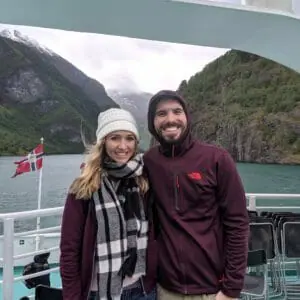One of the many changes David Ginn experienced as he moved from rural Pennsylvania to metropolitan Phoenix was the increase in his concern for the growing climate crisis. Motivated to do something about it, he decided to enroll in the Master of Sustainability Leadership program at Arizona State University.
“The focus on global and strategic perspectives in sustainability seemed like a great trajectory for the program, and the subject matter of the curricula for each course seemed very interesting to me,” Ginn said. “I was not from a traditional sustainability background for my undergrad studies, so this seemed like the perfect bridge into the field.”
This May 2020, Ginn is one of the many graduates from the School of Sustainability. In the following Q&A, learn more about David, his ASU experience and his unique definiton of sustainability.
Question: Can you tell us a little bit about your background?
Answer: I currently live in Phoenix, AZ with my wife Mary but I moved here from a very rural part of Pennsylvania in 2011 to teach music. My family all lives on the East coast. I have two parents still in PA, a brother, sister-in-law, niece and nephew in Virginia, and a sister in New Hampshire. In my free time I play classical guitar.
Q: What was your “aha” moment when you realized you wanted to study sustainability?
A: Well, I’ve always been interested in environmental conservation. My “aha” moment was a combination of the shock of moving to a huge metropolitan area after growing up in a rural place and concern for the growing climate change crisis.
Q: Why did you choose the Master of Sustainability Leadership (MSL) program?
A: The focus on global and strategic perspectives in sustainability seemed like a great trajectory for the program, and the subject matter of the curricula for each course seemed very interesting to me. I was not from a traditional sustainability background for my undergrad studies, so this seemed like the perfect bridge into the field. The diversity of courses and flexibility to adjust your path was appealing to me, and after talking with a graduate who highly recommended the program it seemed like a great fit. He ended up being right!
Q: What’s been your favorite part of being in the program so far and why?
A: Even though it’s entirely online, the professors take special care to get to know their students. They frequently make time to talk one-on-one over the phone or through video conference and are encouraging, helpful, and thorough in their feedback. The program also attracts students from diverse backgrounds who are enthusiastic and engage in thought-provoking discussion.
Q: Are there any particular classes or nuggets of information that have really stuck with you or inspired you?
A: What has stuck with me most is the realization that the toughest decisions we are facing today are not always black and white. As the world grows more and more complex, even decisions that seem obvious have many unknown consequences. This idea of systems thinking really stuck with me and taught me how to account for as many variables down the line as possible before making an informed decision.
Q: Can you tell us about your capstone project?
A: My capstone project involved developing an online platform to promote sustainability education and advocacy for golf courses. I have loved to play golf since I was a little kid, although I don’t play as much as I used to. The fact that there are over 200 golf courses in a dry place like Phoenix fascinated me, and I saw an opportunity to support sustainability in one of the most impactful industries in the Southwest.
Q: What does sustainability mean to you?
A: Sustainability to me means giving more than we take and being a net positive in the world. It’s about not overtaxing the resources the planet makes available to us to achieve balance between what we need and what the Earth can provide.
